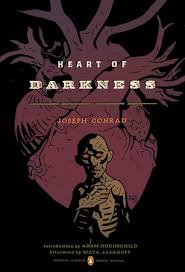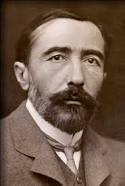Heart of Darkness Page #24
Heart of Darkness is a novella by Polish-British novelist Joseph Conrad, about a voyage up the Congo River into the Congo Free State, in the heart of Africa, by the story's narrator Charles Marlow.
“Some of the pilgrims behind the stretcher carried his arms--two shot-guns, a heavy rifle, and a light revolver-carbine--the thunderbolts of that pitiful Jupiter. The manager bent over him murmuring as he walked beside his head. They laid him down in one of the little cabins--just a room for a bed place and a camp-stool or two, you know. We had brought his belated correspondence, and a lot of torn envelopes and open letters littered his bed. His hand roamed feebly amongst these papers. I was struck by the fire of his eyes and the composed languor of his expression. It was not so much the exhaustion of disease. He did not seem in pain. This shadow looked satiated and calm, as though for the moment it had had its fill of all the emotions. “He rustled one of the letters, and looking straight in my face said, 'I am glad.' Somebody had been writing to him about me. These special recommendations were turning up again. The volume of tone he emitted without effort, almost without the trouble of moving his lips, amazed me. A voice! a voice! It was grave, profound, vibrating, while the man did not seem capable of a whisper. However, he had enough strength in him--factitious no doubt--to very nearly make an end of us, as you shall hear directly. “The manager appeared silently in the doorway; I stepped out at once and he drew the curtain after me. The Russian, eyed curiously by the pilgrims, was staring at the shore. I followed the direction of his glance. “Dark human shapes could be made out in the distance, flitting indistinctly against the gloomy border of the forest, and near the river two bronze figures, leaning on tall spears, stood in the sunlight under fantastic head-dresses of spotted skins, warlike and still in statuesque repose. And from right to left along the lighted shore moved a wild and gorgeous apparition of a woman. “She walked with measured steps, draped in striped and fringed cloths, treading the earth proudly, with a slight jingle and flash of barbarous ornaments. She carried her head high; her hair was done in the shape of a helmet; she had brass leggings to the knee, brass wire gauntlets to the elbow, a crimson spot on her tawny cheek, innumerable necklaces of glass beads on her neck; bizarre things, charms, gifts of witch-men, that hung about her, glittered and trembled at every step. She must have had the value of several elephant tusks upon her. She was savage and superb, wild-eyed and magnificent; there was something ominous and stately in her deliberate progress. And in the hush that had fallen suddenly upon the whole sorrowful land, the immense wilderness, the colossal body of the fecund and mysterious life seemed to look at her, pensive, as though it had been looking at the image of its own tenebrous and passionate soul. “She came abreast of the steamer, stood still, and faced us. Her long shadow fell to the water's edge. Her face had a tragic and fierce aspect of wild sorrow and of dumb pain mingled with the fear of some struggling, half-shaped resolve. She stood looking at us without a stir, and like the wilderness itself, with an air of brooding over an inscrutable purpose. A whole minute passed, and then she made a step forward. There was a low jingle, a glint of yellow metal, a sway of fringed draperies, and she stopped as if her heart had failed her. The young fellow by my side growled. The pilgrims murmured at my back. She looked at us all as if her life had depended upon the unswerving steadiness of her glance. Suddenly she opened her bared arms and threw them up rigid above her head, as though in an uncontrollable desire to touch the sky, and at the same time the swift shadows darted out on the earth, swept around on the river, gathering the steamer into a shadowy embrace. A formidable silence hung over the scene. “She turned away slowly, walked on, following the bank, and passed into the bushes to the left. Once only her eyes gleamed back at us in the dusk of the thickets before she disappeared. “'If she had offered to come aboard I really think I would have tried to shoot her,' said the man of patches, nervously. 'I have been risking my life every day for the last fortnight to keep her out of the house. She got in one day and kicked up a row about those miserable rags I picked up in the storeroom to mend my clothes with. I wasn't decent. At least it must have been that, for she talked like a fury to Kurtz for an hour, pointing at me now and then. I don't understand the dialect of this tribe. Luckily for me, I fancy Kurtz felt too ill that day to care, or there would have been mischief. I don't understand.... No--it's too much for me. Ah, well, it's all over now.' “At this moment I heard Kurtz's deep voice behind the curtain: 'Save me!--save the ivory, you mean. Don't tell me. Save me! Why, I've had to save you. You are interrupting my plans now. Sick! Sick! Not so sick as you would like to believe. Never mind. I'll carry my ideas out yet--I will return. I'll show you what can be done. You with your little peddling notions--you are interfering with me. I will return. I....' “The manager came out. He did me the honour to take me under the arm and lead me aside. 'He is very low, very low,' he said. He considered it necessary to sigh, but neglected to be consistently sorrowful. 'We have done all we could for him--haven't we? But there is no disguising the fact, Mr. Kurtz has done more harm than good to the Company. He did not see the time was not ripe for vigorous action. Cautiously, cautiously--that's my principle. We must be cautious yet. The district is closed to us for a time. Deplorable! Upon the whole, the trade will suffer. I don't deny there is a remarkable quantity of ivory--mostly fossil. We must save it, at all events--but look how precarious the position is--and why? Because the method is unsound.' 'Do you,' said I, looking at the shore, 'call it “unsound method?”' 'Without doubt,' he exclaimed hotly. 'Don't you?'... 'No method at all,' I murmured after a while. 'Exactly,' he exulted. 'I anticipated this. Shows a complete want of judgment. It is my duty to point it out in the proper quarter.' 'Oh,' said I, 'that fellow--what's his name?--the brickmaker, will make a readable report for you.' He appeared confounded for a moment. It seemed to me I had never breathed an atmosphere so vile, and I turned mentally to Kurtz for relief--positively for relief. 'Nevertheless I think Mr. Kurtz is a remarkable man,' I said with emphasis. He started, dropped on me a heavy glance, said very quietly, 'he was,' and turned his back on me. My hour of favour was over; I found myself lumped along with Kurtz as a partisan of methods for which the time was not ripe: I was unsound! Ah! but it was something to have at least a choice of nightmares. “I had turned to the wilderness really, not to Mr. Kurtz, who, I was ready to admit, was as good as buried. And for a moment it seemed to me as if I also were buried in a vast grave full of unspeakable secrets. I felt an intolerable weight oppressing my breast, the smell of the damp earth, the unseen presence of victorious corruption, the darkness of an impenetrable night.... The Russian tapped me on the shoulder. I heard him mumbling and stammering something about 'brother seaman--couldn't conceal--knowledge of matters that would affect Mr. Kurtz's reputation.' I waited. For him evidently Mr. Kurtz was not in his grave; I suspect that for him Mr. Kurtz was one of the immortals. 'Well!' said I at last, 'speak out. As it happens, I am Mr. Kurtz's friend--in a way.'
Translation
Translate and read this book in other languages:
Select another language:
- - Select -
- 简体中文 (Chinese - Simplified)
- 繁體中文 (Chinese - Traditional)
- Español (Spanish)
- Esperanto (Esperanto)
- 日本語 (Japanese)
- Português (Portuguese)
- Deutsch (German)
- العربية (Arabic)
- Français (French)
- Русский (Russian)
- ಕನ್ನಡ (Kannada)
- 한국어 (Korean)
- עברית (Hebrew)
- Gaeilge (Irish)
- Українська (Ukrainian)
- اردو (Urdu)
- Magyar (Hungarian)
- मानक हिन्दी (Hindi)
- Indonesia (Indonesian)
- Italiano (Italian)
- தமிழ் (Tamil)
- Türkçe (Turkish)
- తెలుగు (Telugu)
- ภาษาไทย (Thai)
- Tiếng Việt (Vietnamese)
- Čeština (Czech)
- Polski (Polish)
- Bahasa Indonesia (Indonesian)
- Românește (Romanian)
- Nederlands (Dutch)
- Ελληνικά (Greek)
- Latinum (Latin)
- Svenska (Swedish)
- Dansk (Danish)
- Suomi (Finnish)
- فارسی (Persian)
- ייִדיש (Yiddish)
- հայերեն (Armenian)
- Norsk (Norwegian)
- English (English)
Citation
Use the citation below to add this book to your bibliography:
Style:MLAChicagoAPA
"Heart of Darkness Books." Literature.com. STANDS4 LLC, 2024. Web. 24 Nov. 2024. <https://www.literature.com/book/heart_of_darkness_11>.




Discuss this Heart of Darkness book with the community:
Report Comment
We're doing our best to make sure our content is useful, accurate and safe.
If by any chance you spot an inappropriate comment while navigating through our website please use this form to let us know, and we'll take care of it shortly.
Attachment
You need to be logged in to favorite.
Log In